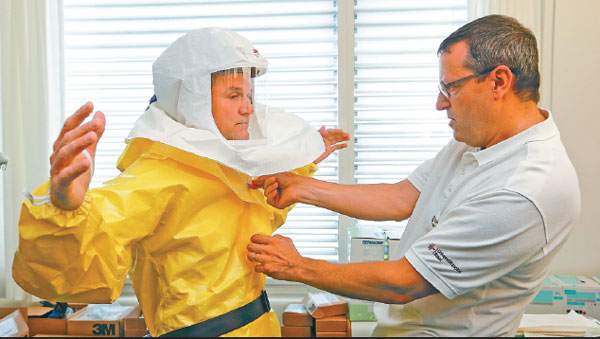Fears over deadly outbreak fuel demand for protective equipment
Since the first US Ebola diagnosis in Dallas last month, demand for hazardous materials suits and face masks has surged, creating a boon for companies that manufacture and sell the protective equipment amid heightened fears the deadly outbreak will spread.
The companies range from well-established medical supply manufacturers to little-known businesses that produce hazmat suits used in West Africa and now US hospitals.
According to company executives interviewed by Reuters, much of the demand has come from governmental and international agencies since the outbreak began in March.
The World Health Organization says that 3 million protective suits will be needed to control the Ebola outbreak worldwide, to ensure that healthcare workers and others do not come into contact with infectious bodily fluids such as blood or sweat.
The virus so far has killed more than 4,400 people, nearly all in the West African countries of Sierra Leone, Liberia and Guinea. Without additional intervention or changes in community behavior, the US Centers for Disease Control and Prevention estimates there could be up to 1.4 million Ebola cases in West Africa by January 2015.
DuPont, a producer of protective suits being used in both West Africa and the United States, said it has more than tripled its production since the start of the outbreak.
Kimberly-Clark, which makes protective disposable medical equipment for healthcare workers, said it has seen a 20 to 30 percent rise in demand compared with the same time period last year. And Medline, a manufacturer and distributor of medical supplies, has reported a more than 40 percent increase in sales of face masks, eyewear and shields, and a more than 25 percent rise in protective apparel sales in the past 30 days.
"Once the first case (in the United States) was diagnosed, we saw an increase in calls", with more than 150 new inquiries a day, said Stephanie Pasko Nelson, vice-president of marketing for Medline's preventive care division.
|
An infection control nurse helps his colleague put on a protective suit during a media presentation at an isolation ward for possible Ebola patients at the Universitaetsspital Basel hospital in Basel, Switzerland, on Wednesday. Arnd Wiegmann / Reuters |
(China Daily 10/16/2014 page12)















